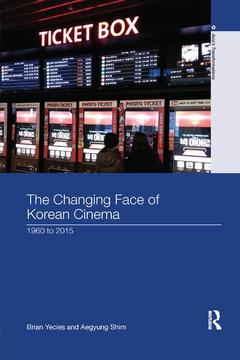Description
The Changing Face of Korean Cinema
1960 to 2015
Asia's Transformations Series
Language: English
Keywords
film; industry; domestic; films; bong; joon; park; chan-wook; busan; international; Korean Film; Young Man; Busan International Film Festival; Korean Film Industry; Bong Joon Ho; Kang Je Gyu; Contemporary Korean Cinema; Korean Filmmakers; CJ Entertainment; Park Chan Wook; Im Sang Soo; Kim Ki Duk; Kim Young Sam; Domestic Films; Screen Quota System; Domestic Film Industry; Shaw Brothers; Shin Film; Korean Film Archive; International Film Festival; Hong Sang Soo; Chinese Film Industry; Korean Practitioners; Women Filmmakers; Chinese Film
Publication date: 06-2018
· 15.6x23.4 cm · Paperback
Publication date: 12-2015
· 15.6x23.4 cm · Hardback
Description
/li>Contents
/li>Readership
/li>Biography
/li>
The rapid development of Korean cinema during the decades of the 1960s and 2000s reveals a dynamic cinematic history which runs parallel to the nation?s political, social, economic and cultural transformation during these formative periods.
This book examines the ways in which South Korean cinema has undergone a transformation from an antiquated local industry in the 1960s into a thriving international cinema in the 21st century. It investigates the circumstances that allowed these two eras to emerge as creative watersheds, and demonstrates the forces behind Korea?s positioning of itself as an important contributor to regional and global culture, and especially its interplay with Japan, Greater China, and the United States. Beginning with an explanation of the understudied operations of the film industry during its 1960s take-off, it then offers insight into the challenges that producers, directors, and policy makers faced in the 1970s and 1980s during the most volatile part of Park Chung-hee?s authoritarian rule and the subsequent Chun Doo-hwan military government. It moves on to explore the film industry?s professionalization in the 1990s and subsequent international expansion in the 2000s. In doing so, it explores the nexus and tensions between film policy, producing, directing, genre, and the internationalization of Korean cinema over half a century.
By highlighting the recent transnational turn in national cinemas, this book underscores the impact of developments pioneered by Korean cinema on the transformation of ?Planet Hallyuwood?. It will be of particular interest to students and scholars of Korean Studies and Film Studies.
Introduction: Introducing "Planet Hallyuwood" Part 1: The Golden Age of the 1960s 1 Hypergrowth of the Propaganda Factory and the Producing Paradox 2 At the Crossroads of Directing and Politics 3 Genre Intersections and the Literary Film 4 Feasting on Asian Alliances: Hong Kong Co-productions and Japanese Remakes Part 2: The Dark Age of the 1970s and Hollywood’s Domination in the Aftermath 5 Policy and Producing Under Hollywood’s Shadow in the 1970s and 1980s 6 Robust Invalids in a New Visual Era: Directing in the 1970s and 1980s 7 Weapons of Mass Distraction: The Erotic Film Genres of the 1970s and 1980s Part 3: The Golden Age of the Post-censorship Era 8 The Rise of the New Corporate and Female Producers 9 The Rise of the Female Writer–Director and the Changing Face of Korean Cinema10 Genre Transformations in Contemporary Korean Cinema 11 Korean Transnational Cinema and the Renewed Tilt Toward China 12 Conclusion Welcome to Planet Hallyuwood
Brian Yecies is a Senior Lecturer in Cultural Studies at the University of Wollongong, Australia.
Aegyung Shim is a past Korea Foundation Postdoctoral Research Fellow at the Institute for Social Transformation Research (ISTR) at the University of Wollongong, Australia.




